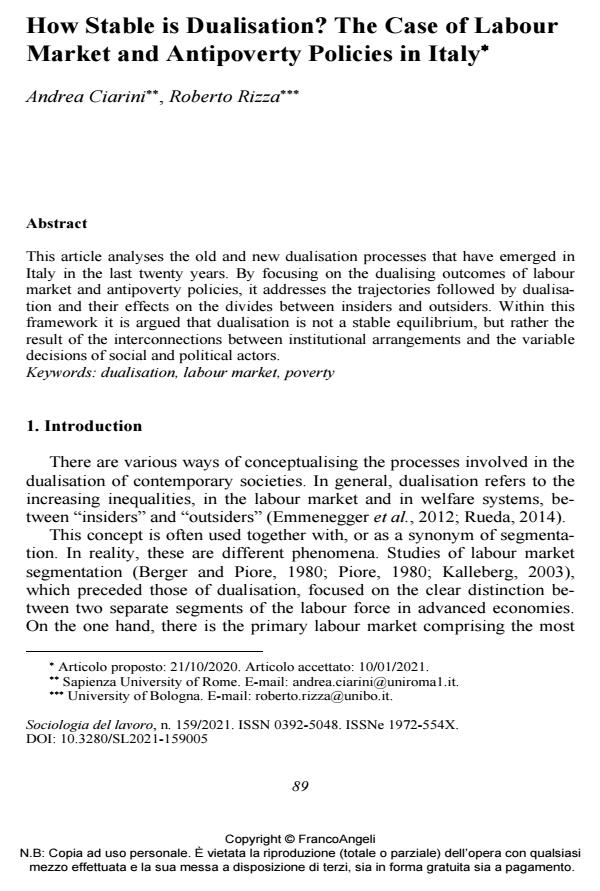How Stable is Dualisation? The Case of Labour Market and Antipoverty Policies in Italy
Titolo Rivista SOCIOLOGIA DEL LAVORO
Autori/Curatori Andrea Ciarini, Roberto Rizza
Anno di pubblicazione 2021 Fascicolo 2021/159
Lingua Inglese Numero pagine 22 P. 89-110 Dimensione file 351 KB
DOI 10.3280/SL2021-159005
Il DOI è il codice a barre della proprietà intellettuale: per saperne di più
clicca qui
Qui sotto puoi vedere in anteprima la prima pagina di questo articolo.
Se questo articolo ti interessa, lo puoi acquistare (e scaricare in formato pdf) seguendo le facili indicazioni per acquistare il download credit. Acquista Download Credits per scaricare questo Articolo in formato PDF

FrancoAngeli è membro della Publishers International Linking Association, Inc (PILA), associazione indipendente e non profit per facilitare (attraverso i servizi tecnologici implementati da CrossRef.org) l’accesso degli studiosi ai contenuti digitali nelle pubblicazioni professionali e scientifiche.
This article analyses the old and new dualisation processes that have emerged in Italy in the last twenty years. By focusing on the dualising outcomes of labour market and antipoverty policies, it addresses the trajectories followed by dualisa-tion and their effects on the divides between insiders and outsiders. Within this framework it is argued that dualisation is not a stable equilibrium, but rather the result of the interconnections between institutional arrangements and the variable decisions of social and political actors.
Questo articolo si concentra sui vecchi e nuovi dualismi emersi in Italia negli ultimi venti anni, con particolare riferimento alle politiche del lavoro e a quelle di contrasto alla povertà. In questo quadro, vengono evidenziate le traiettorie di dualizzazione scaturite dalle riforme che si sono susseguite nel tempo, mostrando come i dualismi non rappresentano un equilibrio stabile nel tempo. Sono piuttosto il riflesso delle interconnessioni tra gli assetti istituzionali ereditati dal passato e le decisioni variabili nel tempo - e nello spazio - degli attori sociali e politico-istituzionali.
Parole chiave:Dualizzazione, mercato del lavoro, Italia, politiche del lavoro, politiche di contrasto alla povertà
- Digitally skilled or digitally competent? Evaluating the impact of e‐Facilitation on young volunteers in Italy Francesco Olivanti, Luca Gastaldi, in Policy & Internet /2024 pp.833
DOI: 10.1002/poi3.405 - L'esperienza del Reddito di Cittadinanza a Taranto: il punto di vista dei beneficiari "occupabili" Maristella Cacciapaglia, in SOCIOLOGIA DEL LAVORO 171/2025 pp.207
DOI: 10.3280/SL2025-171010
Andrea Ciarini, Roberto Rizza, How Stable is Dualisation? The Case of Labour Market and Antipoverty Policies in Italy in "SOCIOLOGIA DEL LAVORO " 159/2021, pp 89-110, DOI: 10.3280/SL2021-159005